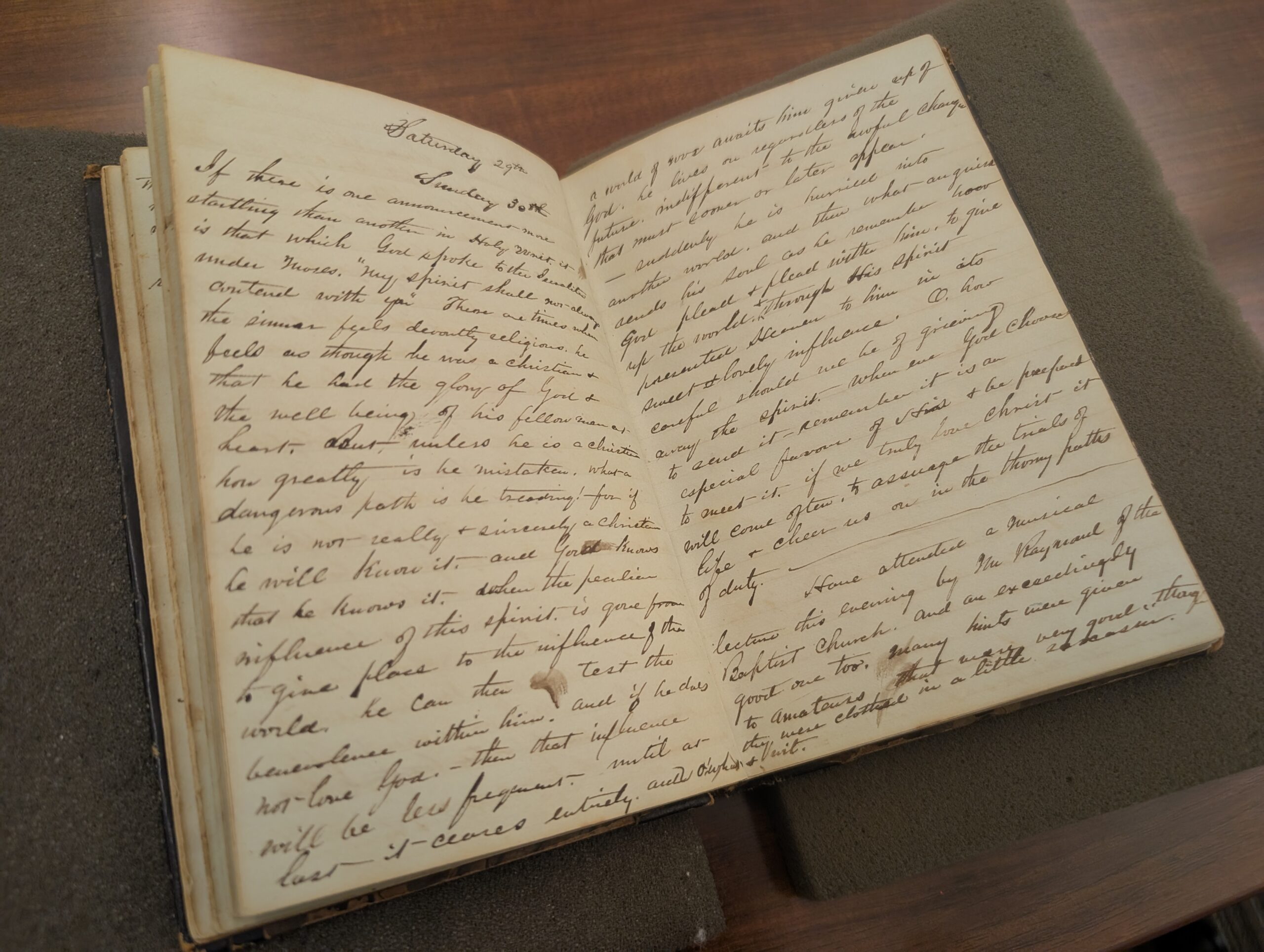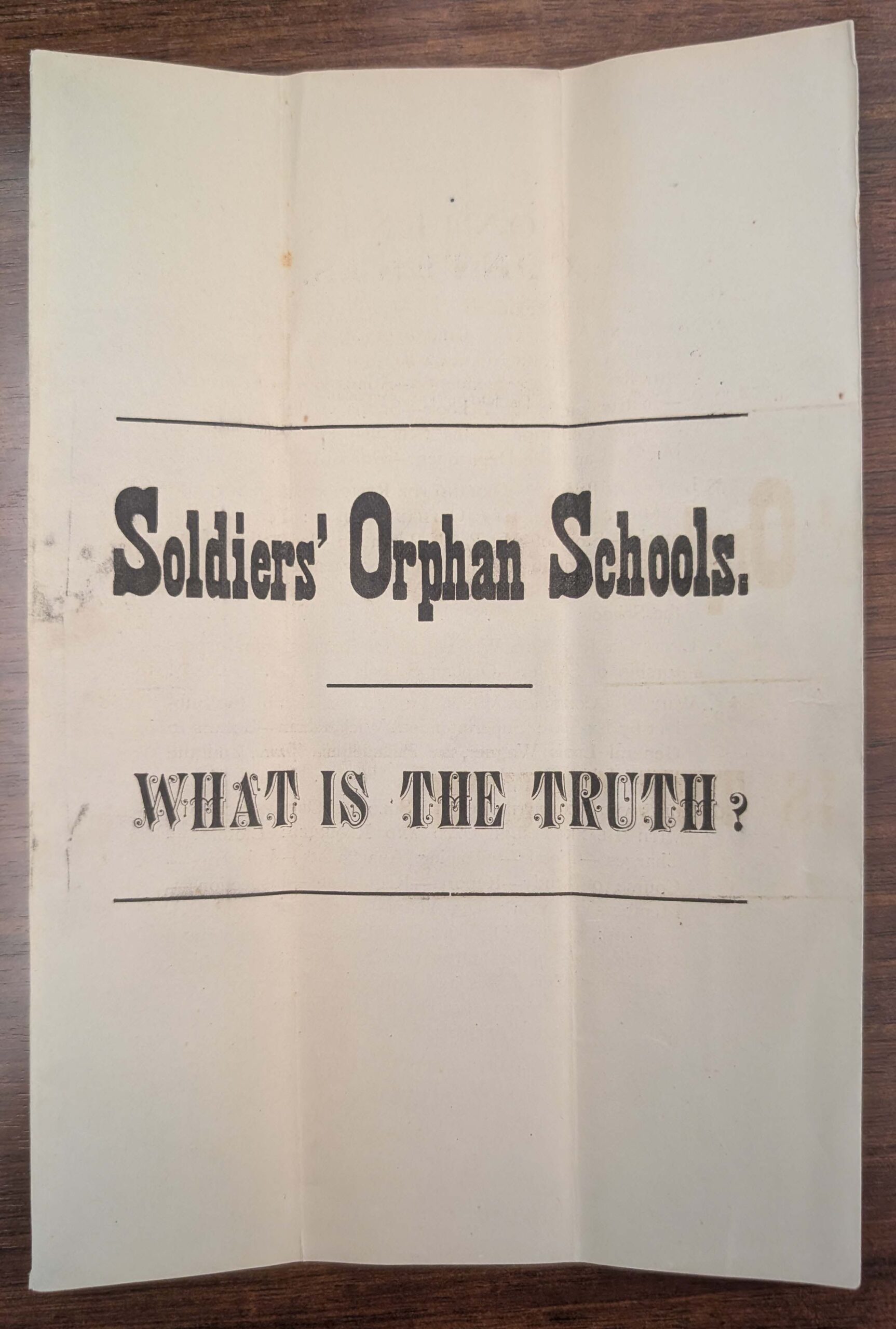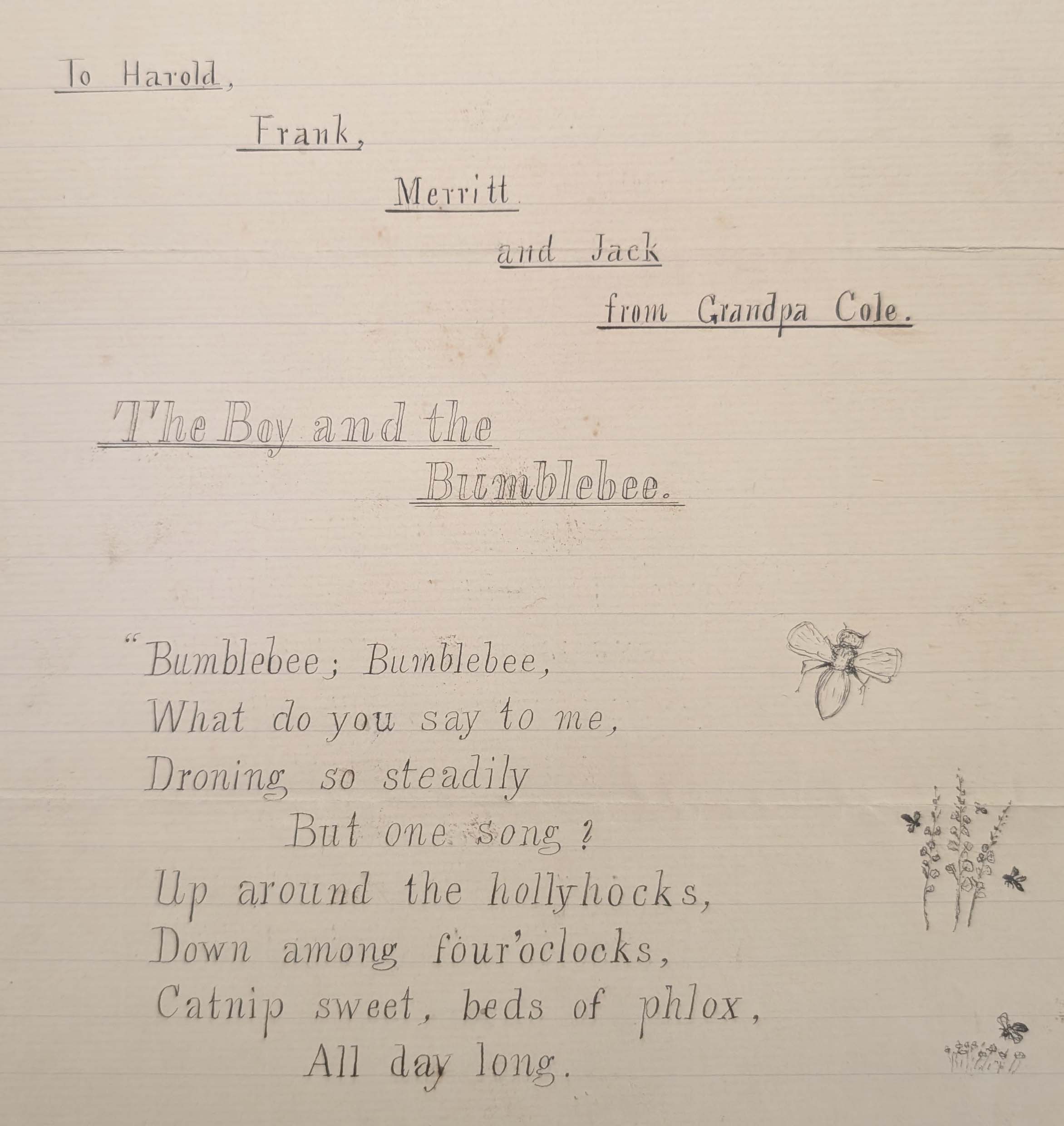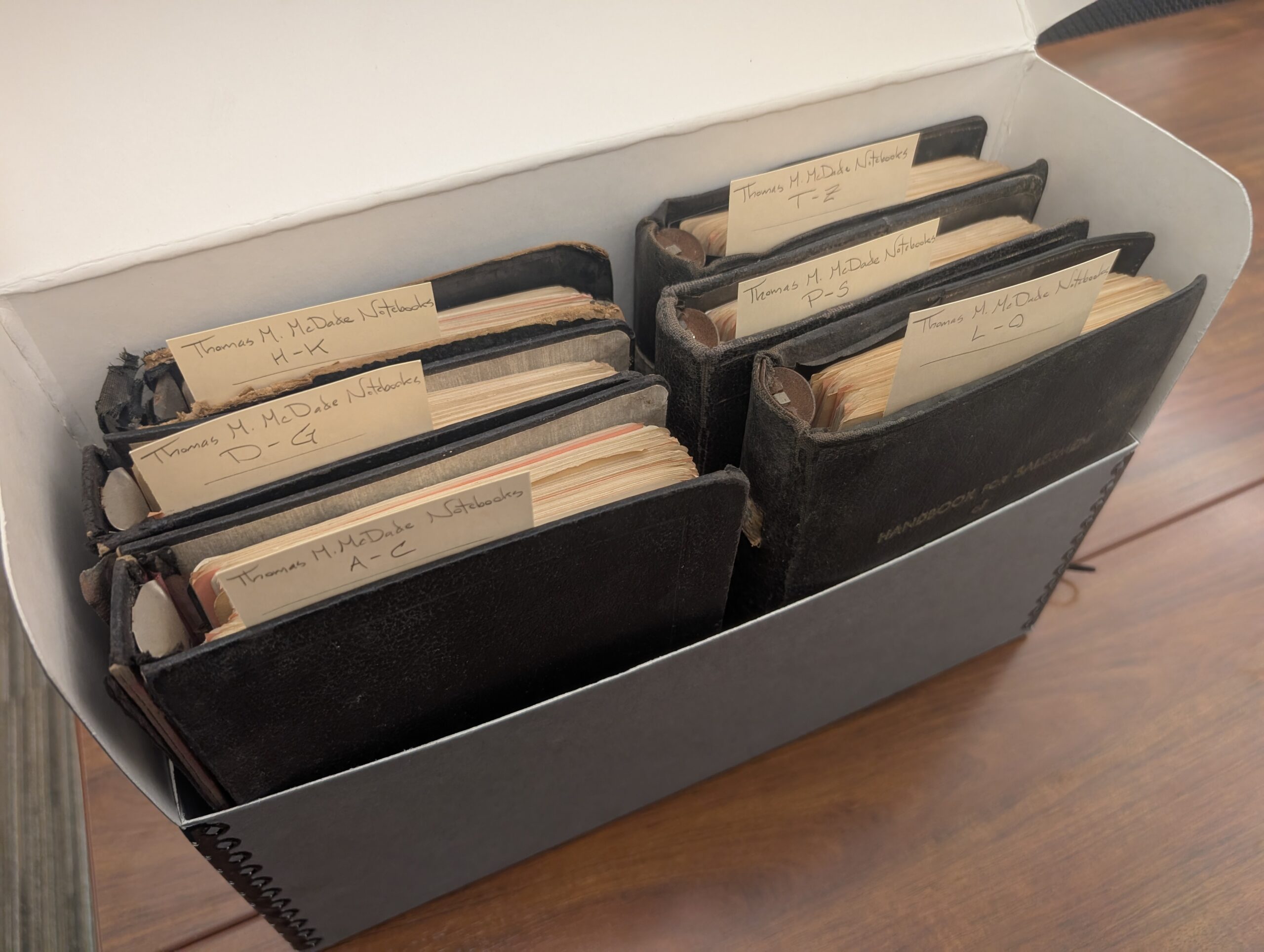The Manuscripts Department has been hard at work making historic hand-written materials available for research. Check out sixteen new finding aids published this past December!
Canaday & Co. daybook, 1843-1845
This daybook kept by Benjamin Canaday of the general goods store B. Canaday & Co. in Georgetown, Illinois, consists of daily accounts of sales and payments made between 1843 and 1845. Goods sold by Canaday included foodstuffs, clothing, spelling and school books, fabrics, tobacco, tools, and more.
Brotherhood Railway Carmen of America, Excelsior Lodge 184 collection, 1902-1937
The Brotherhood Railway Carmen of America, Excelsior Lodge 184, Collection includes two minute books and approximately 50 loose letters, documents, and printed materials related to this Manchester/South Richmond, Virginia, branch of the trade union. The minute books cover the years 1902-1914, 1917-1918, and 1928-1930. The loose letters and documents include a series of 1920s letters, documents, and printed materials pertaining to strike, wage negotiation, and other Union matters. These later papers were apparently compiled by Lem Southworth of the B.R.C. of A. at Richmond respecting laborers on the Southern Railway System.
Enoch Burbank daybook, 1817, 1833-1836
Enoch Burbank of Boscawen, New Hampshire, kept this general store account book in 1817. The daybook entries relate to the sale of molasses, rum, coffee, vinegar, candles, bread, paper, tea, tobacco, silk, butter, powder and shot, cheese, wine, thread, and other goods. Six pages of ledger entries dating from 1833 to 1836 recording the lumbering and sawmill work of Abraham Burbank and Little Burbank.
William Caldwell diary, 1849-1850
William Caldwell kept this diary between 1849 and 1850, while living in or near Syracuse, New York. Caldwell reflected on the importance of keeping a diary as a “mental exercise” and memory aid. He recorded attendance at political, anti-slavery, and religious lectures and meetings (with speakers such as Horace Mann and Gerrit Smith); news of the discovery of gold in California; and thoughts on many subjects, such as the Free-Soil Party, the Hunkers, electrical psychology, literature, science, and pseudo-science.

Pages from William Caldwell’s diary (1849-1850).
Milo D. Campbell manuscript, 1889
Milo D. Campbell compiled this volume of jokes, stories, epitaphs, question and answer routines, and extracts from literature and newspapers around 1889. The humor or wit frequently relied on racist, ethnic, sexist, and class stereotypes, including derogatory representations of African Americans, Jews, Irish people, and Germans. Themes include family dynamics, funerals, bigamy, and much else.
Canfield Press subscription and record books, 1842-1854
This collection is made up of two volumes of subscription and business records relating to the Akron, Ohio, printing and publishing business of Horace Canfield and his son Horace Canfield, Jr., between 1842 and 1853.
Chesterfield County (Va.) account ledger, 1843-1847
This 154-page ledger contains accounts of a currently unidentified farmer, miller, and feed supplier in Chesterfield County, Virginia, between 1843 and 1847. The volume contains entries for male and female customers, who purchased significant quantities of meal, oats, and bran, as well as smaller amounts of corn, tobacco, Irish potatoes, turkeys, pullets, and fodder. Entries for hiring horses, carriages, and carts are also present, with a few specifically hired for transportation to Richmond.

Soldiers’ Orphan School Printed Reports from the William E. Coffman papers.
William E. Coffman papers, 1875, 1882-1891
Collection processed and finding aid created by graduate student interns Theresa Azemar and Diana Baxter!
This collection is made up of pension, Grand Army of the Republic (GAR), and other papers of Civil War veteran Private William E. Coffman of Company A, 6th Pennsylvania Reserves/35th Pennsylvania Volunteer Infantry. The 123 items include pension applications, correspondence from pension lawyers, and printed materials such as advertisements, ephemeral items, broadsides, circulars, and cards dating largely between 1885 and 1891. Most of the printed items are solicitations directed toward Civil War veterans generally and GAR members particularly.
Culpeper County (Va.) account book, 1859-1864
An unidentified farmer in Culpeper County, Virginia, kept this 39-page account book between late 1859 and June 21, 1864. Thirty-four pages of ledger entries show a variety of men and women purchasing farm goods such as corn, meal, flour, beef, bacon, and other products. In return, his customers were credited through unspecified, skilled, and unskilled labor; cash; and goods such as farm implements. Laborers, for example, sowed, thrashed, raked, and stacked wheat; mowed; cut oats; and heeled, capped, halfsoled, pegged, nailed, and vamped shoes and boots. At least one entry for shoe repair appears to be for enslaved persons’ shoes. The keeper of the accounts also rented out a house and garden for $25.00 per year, to Miss E. Benear in 1861 and French Martin in 1862.
Orselas Evans letters, 1858-1859, 1869
This collection is made up of three letters from Great Lakes commercial shipowner, sailor, and farmer Richard O. Evans (“Orselas Evans”) to his parents, giving them updates on his family and activities on Beaver Island and in Grand Traverse Bay area, Michigan, 1858-1859, and Peshtigo, Wisconsin, 1869. Orselas wrote about co-purchased ships, his time as a farm owner on Beaver Island, socio-political violence on Beaver Island around the 1858 spring elections, grief and family care on the death of his sister-in-law Harriet, logging and land ownership in Michigan and Wisconsin, and temperance. One page of genealogy accompanies the letters.
Green Mountain Telegraph Company, Peru (Vt.) Office record book, 1880-1897
This volume is a record of telegraphs sent from and received at the Peru, Vermont, Office of the Green Mountain Telegraph Company between July 1880 and May 1897. The custom-printed pages have tables for recording data about each telegraph. The columns are headed Names Officers, Address, To What Place, Signature, From What Place, No. of Words, Local Cash, and information about office receipts, checks, and other lines. Each page documents a month’s activities and J. E. McNaughton, W. E. L. Walker, E. G. Bacon, or other managers signed accounts as they were settled, typically in the weeks after the end of the month.
E. Merritt Cole collection, approximately 1890s-1900s
E. Merritt Cole of Colorado created these 55 manuscript poems and fine-line ink drawings of flowers and plants around the turn of the 19th-20th century. The artist used calligraphic lettering for their poetry, including tree-shaped characters. A few groups of illustrations are bound with ribbon and appear to have been created as gifts or gift books. Many of the works include multiple stages in the process of creating a final version.
Fernando C. Jacobs account books, 1844-1861
This collection includes two daybooks kept by Fernando C. Jacobs of Canaan, Vermont, between 1844 and 1861. These overlapping volumes contain accounts of tanners and cobblers Jacobs & Fletcher, with a record of daily sales of tanning and footwear making, mending, tapping, and binding services. They sold horsehides, calf skins, kipskins, sheepskins, leather, moose hair, leather, straps, buckles, shoes, boots, moccasins, slippers, cows, butter, and meats (such as moose and beef). By the mid-1850s, the accounts show increasing sales of medicines (pills, liniments, etc.), tobacco, cigars, foodstuffs such as flour, mackerel, oysters, rum, and gin. Consumers paid with cash, hay, wheat, cash, corn, turnips, supplies, and labor.

The Boy and the Bumblebee by E. Merritt Cole, addressed to his family.
Josiah Morse account book, 1846-1856, 1876
Reverend and physician Josiah Morse of Stewartstown, New Hampshire, kept this account ledger between 1846 and 1854. The entries are largely for medical services, treatments, and medicines for clientele in Stewartstown and other nearby locations. In addition, Morse occasionally took in boarders, rented out his cutter and gig, and received subscription payments for his services as a Congregational minister. Clients paid with cash, skilled services, labor, foodstuffs, and other goods. Laid into the volume are two pages of accounts for travel, room, board, medicine, washing, postage, life insurance, and sundries for the period of June 1, 1850, to June 5, 1851, paid by the Marquette Iron Company for Dr. Morse’s year of service as physician and minister at Marquette, Michigan.
Page County (Va.) account ledger, 1866-1869
This General Store ledger documents the sale of a wide variety of goods in Page County, Virginia, between 1866 and 1869. The volume contains entries for various types of cloth (calico, “Ken Jeans” [Kentucky jean], cottons, gingham, casinett, etc.), blank books, hardware (screws, nails, locks, etc.), tobacco, rye, rice, eggs, sugar, bacon, castor oil, fish oil, sugar, watches, saltpeter, butter, blinds, soaps, coffee, gloves, shoes, shoe strings, pants, socks, cravats, handkerchiefs, pant and coat patterns, candles, tallow, rosin, turpentine, spectacles, thimbles, and much more. The proprietor was likely Emanuel Grove or another member of the Grove family.
Thomas M. McDade notebooks, 1950s-1962
Titled “American Murders 1675 – 1900 A Bibliography of American Murder Trials and Cases by Thomas M. McDade,” these six black three-ring notebooks are a typed working draft of The Annals of Murder: A Bibliography of Books and Pamphlets on American Murders from Colonial Times to 1900, published in 1961 by the University of Oklahoma Press. The draft contains McDade’s manuscript revisions, additions, and notes, as well as a few laid-in library call slips and suggested corrections sent to McDade after the release of the publication.

Thomas McDade’s working draft of “The Annals of Murder: A Bibliography of Books and Pamphlets on American Murders from Colonial Times to 1900.”
